Mum who killed her baby 'haunted' by secret for 25 years
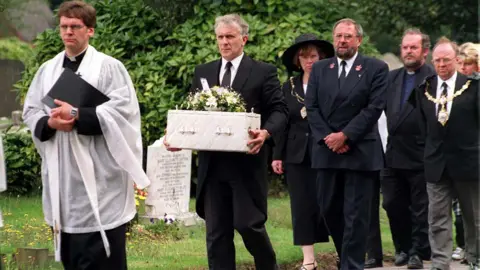 Liverpool Daily Post/PA
Liverpool Daily Post/PA"When I heard about it and I saw her name, I thought 'that's not that woman - that's not the same woman that we've lived by all these years'."
That was how a resident of a cul-de-sac in Liverpool described the moment she learned her neighbour for more than 30 years - Joanne Sharkey - had been charged with the 1998 killing of her baby boy.
Another neighbour said when police first arrived at the family's "immaculate" semi-detached house in July 2023, she had thought one of the lodgers they sometimes hosted must have been in trouble.
It simply did not make sense that someone like "kind, funny and normal" council worker Joanne Sharkey could have committed a crime.
But the truth was detectives had, finally, cracked a cold case that had lingered unsolved on the books of Cheshire Police for 25 years.
On Friday Sharkey was handed a two year prison term, suspended for two years, after a judge concluded her post-natal depression had impaired her judgement so severely the case "called for compassion" rather than punishment.
For Sharkey the past quarter of a century had, in her own words, been spent "waiting for that knock on the door".
In March 1998, a man walking his dog in the Callands area of Warrington, Cheshire, spotted something wrapped in two knotted bin-bags.
Inside was the body of a newborn baby boy, weighing 7lbs 5oz.
With no immediate clue where he had come from, local people gave him the name Callum, after the Callands area where he was found.
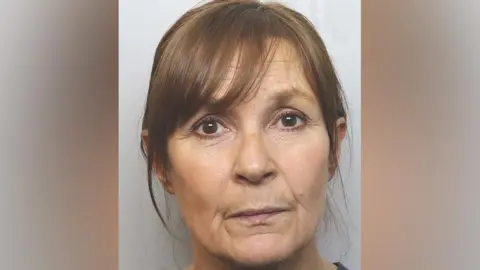 Cheshire Constabulary
Cheshire ConstabularyAround 20 miles away in Croxteth, Liverpool, his mother had not told a soul - including her husband Neil Sharkey.
Not only had Sharkey hidden the birth and death of Baby Callum, but no-one had ever known she had been pregnant.
Mr Sharkey would spend the next 25 years oblivious to the fact he had fathered a second child.
Years later, it was older son Matthew, born in 1996, who inadvertently unlocked the mystery of Callum's identity.
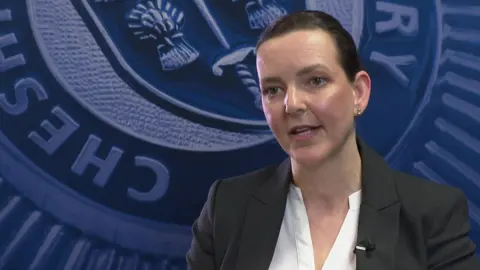
In the days after Baby Callum's discovery, tests found wads of tissue paper had been inserted into his mouth and throat, confirming it was not likely to have been an accident.
Forensic investigators found blood from the baby's mother on the binbags and were able to extract a full DNA profile.
A list was drawn up of teenage girls who had been absent from three local schools around the time of Baby Callum's death so their DNA could be tested.
A number of young women were even arrested after their families suggested to detectives they might be involved.
But the original investigation stalled, and the years rolled on.
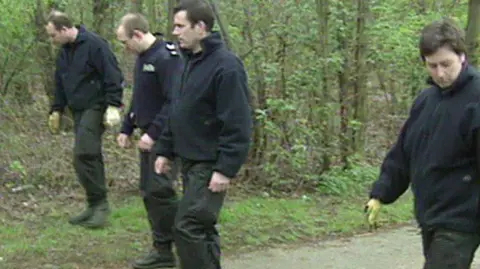
In 2016, the first review of the national DNA database was ordered, resulting in a list of hundreds of names of potentially linked people.
Some attempts had been made to narrow it down by the time Det Insp Hannah Friend took on the case in 2021.
Early in the case, detectives were "thrilled" when a name caught their attention. It was someone who lived near where Callum was found and had been spoken to by the original investigation team.
But they had not given a statement or had their details recorded properly.
"We thought maybe this is somebody who slipped through the net and as it turned out it wasn't at all," Det Insp Friend said.
"We were all so disappointed because we thought we'd solved it."
Red herring
After two years of ruling out potential suspects from the original list, Det Insp Friend made the decision in 2023 to run a new trawl of the national DNA database.
She was confronted with a fresh list of roughly 500 names, and, in her words, a new search for "a needle in a haystack".
But this time was different - amongst the names was Matthew Sharkey.
Initially his name was one among several interesting DNA profiles which were sent to a forensic scientist for more detailed comparison with Baby Callum.
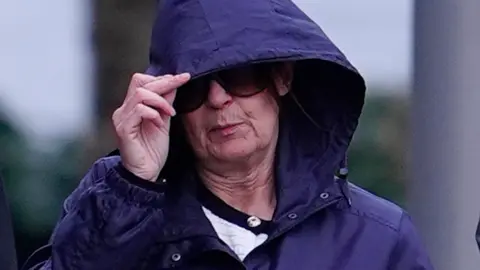 PA Media
PA MediaA few months before Joanne Sharkey was arrested, Det Insp Friend got an email from that scientist with the subject heading: "Are you sitting down?".
The email confirmed Matthew Sharkey was a direct relative of Baby Callum, with a one in 36 billion likelihood of him not being.
Det Insp Friend said: "We were able to identify a woman who we thought was the mother of Callum - and that was Joanne Sharkey."
The investigation team were at pains to be as sure as they could be that they had the right person before moving in - as the next step was a devastating one.
"I didn't want to be walking through that door and destroying people's lives", Det Insp Friend said.
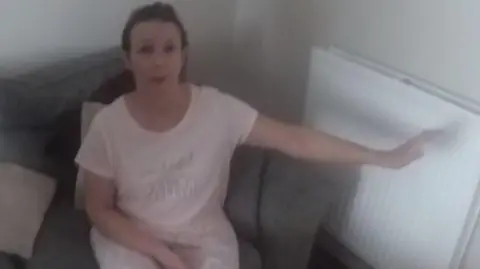 Cheshire Constabulary
Cheshire ConstabularyJoanne Sharkey was sitting on a couch in pink pyjamas bearing the word "mum" when police went in on 28 July 2023.
Bodyworn camera footage showed her listening to the arresting officer, wide-eyed but quiet and compliant.
Gesturing towards her stunned husband, she told the arresting officer: "He doesn't know anything about this."
With no evidence at that stage about how Callum had died or at whose hands, both parents were arrested.
A court later heard that, unbeknown to them, they were recorded as they sat in the back of a police car on the way to the custody suite.
Sharkey said to her husband: "I'm not... going to deny nothing. It is what it is, isn't it? I... did it."
In hours of police interviews, Sharkey explained how in the summer of 1998 she had become pregnant for a second time.
In the grip of severe but undiagnosed post-natal depression following the birth of Matthew, she said her reaction had been "I can't do this again".
She told police she had been "terrified" to see news coverage about Baby Callum and think "that was me".
"It's haunting, something you think about every day," she said. "You try and push it out but it creeps back in."
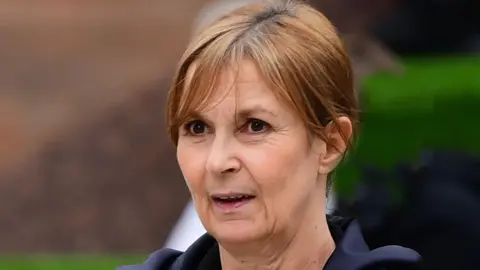 Mirrorpix
MirrorpixEarly on, she had been unsure if she was pregnant, but there were no doubts from around five months in.
She told police her husband's long hours and shifts meant they had been "strangers in the night" and it had not been difficult to hide her growing bump by wearing baggy clothing.
In a remarkable statement later read in court by Joanne Sharkey's barrister, Neil Sharkey himself described how he was "not the greatest husband and father" and how he "blamed himself" for what had happened.
Sharkey told police her memory was scattered with blanks about Callum's birth - but she recalled how Neil and Matthew must have been out of the house.
She also could not recall precisely what she did to end his life, only that she felt she "just had to make him quiet".
Medical evidence suggested Callum had likely been subjected to some form of mechanical asphyxiation.
Sharkey described driving aimlessly until she came to the spot near Gulliver's World theme park where she dumped Callum's body.
Promise kept
It later emerged she was spotted on that day by a retired man out for a walk who remembered a woman emerging from the woodland looking visibly upset.
From this point, the questions left were complex legal and medical ones.
Was Joanne Sharkey capable of forming a rational judgement when she killed Callum, and was she guilty of murder or manslaughter?
The evidence from psychiatrists commissioned by both the defence and the prosecution all pointed the same way - Sharkey's mental illness meant she had a partial defence to murder.
Det Insp Friend said: "My responsibility as an investigator is to follow the evidence and to develop that evidence so we can seek the truth.
"My personal feelings about [Sharkey]? You wonder on one hand how anybody could do this to a beautiful child, a precious child who deserved to live.
"On the other hand I think, how awful to be in this situation where you think that is the best and only option that you have."
Sharkey's fate was decided at Liverpool Crown Court on Friday morning by judge Mrs Justice Eady, who decided the sentencing exercise "called for compassion".
She was given a two-year prison sentence suspended for two years, with a requirement for mental health treatment.
For Det Insp Friend and her team, that promise made by Callum's graveside in 2021 had been fulfilled.
She added: "We will, once sentencing has concluded, go back to his grave to lay some flowers and just pay him our respects and I hope that he can rest in peace."
Read more stories from Cheshire on the BBC, watch BBC North West Tonight on BBC iPlayer and follow BBC North West on X. You can also send story ideas via Whatsapp to 0808 100 2230.
